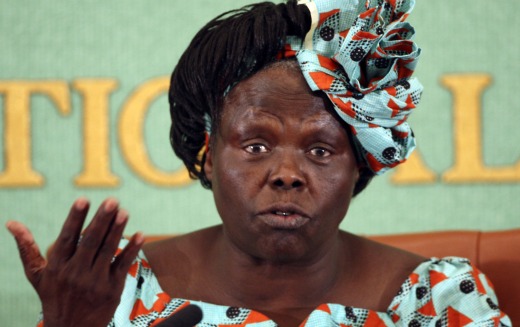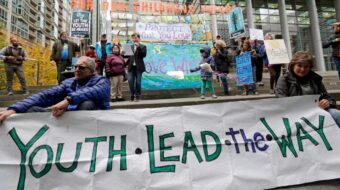
Wangari Maathai astutely analyzed the plight of her Kenyan home area, mainly Kukuyan women. Two issues repeatedly surfaced and intertwined. The deteriorating environment was an integral part of their plight. Clear streams and rivers turned brown with topsoil loss from deforestation. Nutritious native crops were replaced by the mono-cultured, cash crops of tea and coffee. The polluted water and lack of nutritious food were contributing to unhealthy children. Women also needed income.
Gripping those main threads, seeing the connections between them and not losing focus, she went to work. The result – thousands of women, and men, obtained employment ameliorating the environment. And across her homeland, thirty million trees bloomed.
By now, any activist reading these lines knows what probably happened to achieve all this. Beatings, jail time, relationship woes, sabotage, no money, movement participants turned thieves, life underground, vilification in the press, and government spies. Through it all, Dr. Maathai remained, in her words, unbowed.
Wangari Maathai, who passed away Sept. 25 at the age of 71, won the Nobel Peace Prize in 2004.
From very humble origins in the Kukuya region in the Rift Valley of Kenya, she was part of the Kennedy airlift. Six hundred Kenyans, including President Barack Obama’s father, were brought to U.S. colleges and universities.
One of her first roadside stops here brought her face to face with Jim Crow. Maathai and her African companions were denied seating at a bus stop. She came to admire Martin Luther King and the civil rights movement. These experiences were important, as nonviolent protest became a weapon in the environmental and political struggles that ensued upon her return to Kenya.
Maathai’s political maturation grew as she strove to connect the Green Belt Movement to twomen’s groups to freeing political prisoners. The struggle to save the Uhuru (Freedom) Park, 34 acres of green in central Nairobi, included all these forces. Harassment, violence and jail met her and those movements at every step.
Truth was a casualty of struggles in Kenya going back to the fight for liberation from England and colonialism. Despite hysteria in the bourgeois press in the late 1950s, 32 white settlers were killed out of the 4,000 total who died at that time. Estimates indicate over 100,000 Africans died in concentration camps and emergency villages.
Some Kenyan leaders, particularly its second President Moi, pursued their own agenda of concentrating wealth and power, cynically used tribal and ethnic divisions that were exasperated under colonial rule.
In a twist of the truth, President Moi accused Maathai of divisive tactics.
Early in 1999, there was a pivotal action and outcome for the environment and the people of Kenya. A large delegation of the Green Belt Movement, members of Parliament, journalists, foreign guests and members of the Kenyan Human Rights Commission visited the front entrance to the public Kurura forest, site of a privatization effort by the government. Two hundred thugs, many unemployed youth, who were wielding machetes, clubs, whips, swords and bow and arrows, confronted them. Wangari Mathai explained that they simply wanted to plant a tree outside the entrance to the forest. It was to no avail. The delegation was viciously attacked, sustaining broken legs and arms. Maathai was beaten with blood streaming down her head.
When police later refused to arrest those involved in the unprovoked attack, the press revealed the police’s relationship to the thugs. An early arriving cameraman caught the police talking to the thugs. It was a classic example of the state being complicit in fomenting violence to protect rich private landowners.
While it wasn’t the end of green actions and violence, the national and international condemnation of the attacks saved the forest.
Dr. Maathai painfully learned that those in political power in Kenya exemplified what Harold Pinter stated in accepting his 2005 Nobel Prize for Literature.
“To maintain … power it is essential that people remain in ignorance, that they live in ignorance of the truth, even the truth of their own lives,” he said.
In her striving to get the truth to the people for their conditions of life, she became a candidate for the Kenyan Parliament. In doing so, she attempted to unite the many political parties and candidates to displace the ruling KANU Party and President Moi.
She helped found the Mazingira Party. Mazingira means environment in Kiswahili. They connected to the Federation of Green Parties of Africa and Global Greens.
In 2001, President Moi opened a women’s seminar in Nairobi and told the assembly that “because of your little minds, you cannot get what you are expected to get.” The revulsion to this statement combined with finally successful efforts to unite opposition parties, led to Wangari Maathai winning a seat in parliament, getting 98% of the vote in 2002.
The leopard, which is what Wangari means in Kukuru, was fully tempered.
Wangari Maathai presente!
Nick Bart is an environmental activist.
Photo: Kenyan environmentalist and 2004 Nobel Peace Prize winner Wangari Maathai speaks during a 2010 press conference at Japan National Press Club in Tokyo. (AP/Koji Sasahara)










